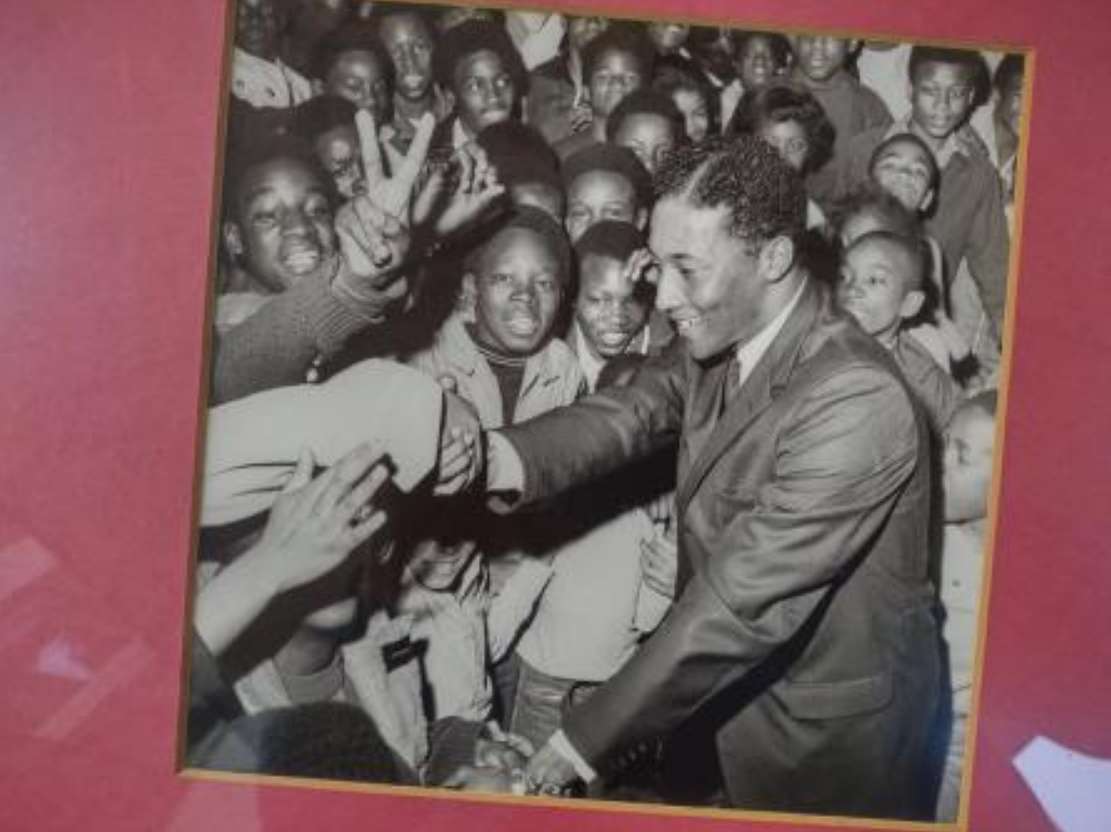
Alexandria Civil Rights leader Ira Robinson, the first Black man elected to the City Council after Reconstruction, died last Friday at his home in Temecula, California.
Robinson was 85 years old.
Robinson was elected to the City Council in 1970. Before the election, 19-year-old Robin Gibson was murdered at a 7-11, which sparked three days of rioting. Robinson was credited with settling the riots and, at one point, saving the life of an Alexandria policeman surrounded by an angry crowd.
Robinson served on the City Council for three years and was instrumental in working toward full compliance with desegregation laws.
During the many challenges in America at a time, Ira Robinson represented hope for a new America,” said McArthur Myers, who was the youth coordinator for Robinson’s campaign.
In a release, the City of Alexandria detailed some of Robinson’s history with the city:
During his three-year term on the Council, Robinson was instrumental in bringing about major changes in education, housing, and law enforcement, including a 1971 secondary school integration plan that brought the Alexandria public schools into full compliance with federal desegregation law. Nearly three decades after that plan consolidated three previous high schools into T.C. Williams secondary school, the turmoil of that period – and the resulting football championship that reunited the community – remained such a potent story that it became the basis of the Disney movie, Remember the Titans.
Also marking that era in Alexandra politics were the titanic, but civil, debates between Robinson, a Democrat, and Wiley F. Mitchell, a Republican, whose priorities for the city, though often at odds, led to steady increases in minority hiring, the distribution of moderate and low-income housing city-wide, the development of the Metro area transit system, and eventual redevelopment of the Potomac Railroad Yard, Cameron Station, and the neighborhoods along the Route 1 corridor and Mount Vernon Avenue.
Before his election to council, Robinson focused much of his activism on changing the face of policing in the city and on relations between police officers and Alexandria’s African-American youth. In 1968, he served on the Alexandria Crime Commission and, the following year, as adviser to a Michigan State University team, hired by the city manager to produce a “Study of Police Community Relations” in Alexandria. Robinson also served on the Alexandria Commission on Criminal Justice and the Metropolitan Council of Government’s Task Force on Drug Abuse. He also chaired the city’s Urban League voter registration drive, served on the boards of the local branch of the NAACP and the Boys Club, and was a member of the Alexandria Economic Opportunities Commission and the Mayor’s ad hoc Committee on Health Care. An avid sports fan, he advocated for young African American athletes who needed legal advice.
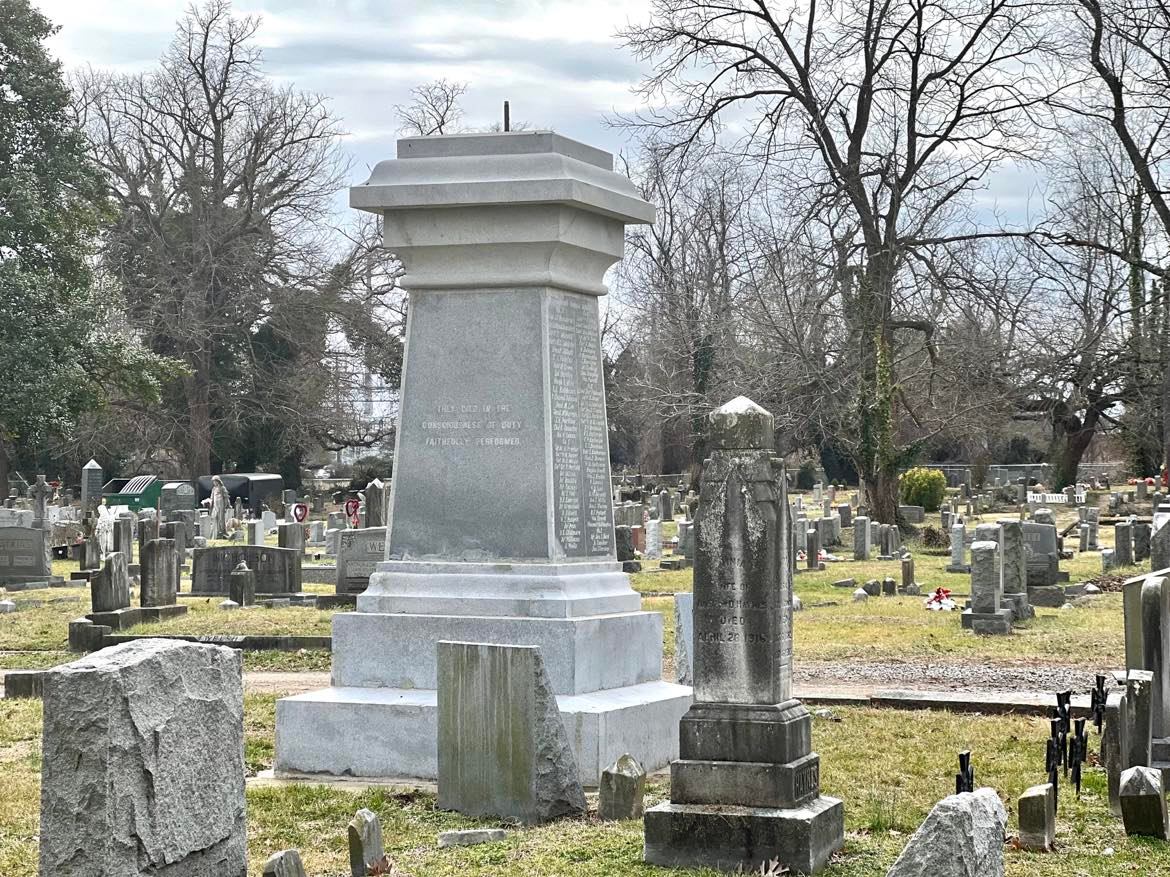
The historic cemetery tour: it’s the one locals are dying to get into.
A tour coming up this Saturday (April 27) will reacquaint Alexandrians with some of their post-mortem neighbors and hear buried histories of duels, cavalry battles and more in the Wilkes Street Cemetery Complex (1475-1501 Wilkes Street).
According to the Office of Historic Alexandria:
Embark on an extraordinary walking tour through the historic Wilkes Street Cemetery Complex. Immerse yourself in the captivating lives of remarkable individuals laid to rest here who share a profound connection to the landmark Lee-Fendall House. This exclusive tour offers a rare opportunity to visit gravesites not typically covered elsewhere, unveiling tales of duels, cavalry battles, encounters with the Marquis de Lafayette, and many other intriguing narratives.
Tickets for the tour are $20 per person and all proceeds go directly to the preservation and maintenance of the Lee-Fendall House. The tour is limited to 25 participants, starts at 1 p.m. and lasts approximately one hour.

A new advocacy group has formed in hopes of returning Alexandria to a district/wards election system.
The Communities for Accountable City Council (CACC) describes itself as a non-partisan group of Alexandria residents “exasperated with the intransigent Alexandria City Council that is unaccountable to communities and neighborhoods because of Alexandria’s At-Large election system.”
While the group is non-partisan, leader Tom Kopko said the origins of the group are in the contentious decision last year to end single-family-only zoning as part of a new plan called Zoning for Housing.
“We’re a group of people who are totally frustrated with the obvious intransigence and lack of accountability of City Council,” Kopko said. “There’s a long list of grievances, the latest is Zoning for Housing. They betrayed homeowners and, against massive opposition, passed [Zoning for Housing] unanimously.”
Zoning for Housing faced opposition from local homeowners, but also garnered support from others who say greater density is the only path to building enough housing to make Alexandria affordable.
Kopko said the feeling among residents he’s spoken to is that the City Council is unaccountable because they’re elected at large.
“Citizens have no recourse against seven elected officials and staff, all because they’re elected at large,” Kopko said. “Who is the person who cares about your neighborhood?”
Kopko pointed to a federal judge’s ruling that Virginia Beach’s at-large voting system is illegal as an example of at-large voting being struck down elsewhere in the state.
“Rejection of district elections is a rejection of every other electoral system that we all know and expect,” Kopko said. “The smaller the district, the more responsive the elected representative. That principle applies to anybody, no matter where they live.”
While Kopko said the group was formed in response to opposition to Zoning for Housing, Kopko said he believes the change could also benefit those who live in apartments or supported Zoning for Housing.
Regardless of where people are on Zoning for Housing: nobody had a representative for their community. Everyone had to try and lobby seven different people. That is totally unfair. The Zoning for Housing decision didn’t allow, for example, Del Ray — which was completely betrayed by Zoning for Housing — to hold any particular person accountable. Now they have to try and hold seven people accountable? That’s not the American way, no matter what their community of interest is.
A change to the district or ward system would require changing the city charter, Kopko said.
CACC said the district/ward system is a relic of segregation:
For its first 150 years, Alexandrians elected their city government by district/ward, until 1950 when segregationists installed at-large elections to suppress minority voices. Today, at-large elections similarly insulate the centrally-elected City Council from all voices, even betraying their core supporters.
This is far from the first time wards have been discussed for Alexandria’s City Council. A Washington Post article in 1992 highlighted similar back-and-forth arguments over wards. Reporter and historian Michael Lee Pope wrote that there was a similar battle between Del Ray and Old Town in 1932.
Last year, all current City Council members expressed unanimous opposition to a ward system in Alexandria.
Mayor Justin Wilson said he has mixed feelings on wards; saying that while he isn’t opposed to them in general, he doesn’t think they’d solve problems in Alexandria.
“I’m not categorically opposed to wards, but I generally don’t think they would solve the issues those who advocate for them believe they would,” Wilson said.
Wilson said most advocates for wards are either opposed to a specific land-use decision and believe the result would be different with specific neighborhood representation — as is the case with CACC — or are Republicans and other political groups who believe they could get more representation if the city had wards — as was the case in 1992.
But Wilson said having one member out of seven opposing a project with a citywide benefit won’t derail a project.
“If anything, it could make the Council less likely to incorporate the concerns of localized opposition,” Wilson said.
For those Republicans hoping to get a seat on Council via wards, Wilson said there’s further bad news.
“There is really no way you could draw wards in Alexandria to result in ‘Republican’ districts,” Wilson said. “Our lowest Democratic-performance precincts are still 50+%.”
Still, Kopko said the current at-large system is a relic of a bygone era that needs removal.
Pope wrote that advocates of the at-large system argued the removal of “sectorial interests” would create better candidates to lead the city. Meanwhile, opponents of the at-large system argue, as Kopko does, that the at-large system allows the City Council to overlook the interests of parts of the city without facing consequences.
Alexandria Living Magazine reported that the vote for an at-large system in 1950 intentionally limited minority voices.
“The origins of the at-large system are quite ugly, from the segregationist period — from the TC Williams era,” Kopko said. “I don’t know how anyone reading the history of a large system being based on a segregationist system could be in favor of it. How could you?”

Here’s a roundup of all the events, live music, and entertainment happening around Alexandria this weekend; enjoy!
Are you organizing an event? Submit events to ALXnow.
Friday, April 12
Things To Do
- 9 a.m.: 2024 Spring Garden Market at River Farm
- 10:15 a.m.: Just Babies at Kate Waller Barrett Branch Library
- 3:30 p.m.: Lego Competition at James M. Duncan, Jr. Branch Library
- 3:30 p.m.: Fun Friday at Ellen Coolidge Burke Branch Library
- 6:30 p.m.: Make Your Own Candle with Bark Social Alexandria
- 7 p.m.: Torpedo Factory Art Center’s 2nd Friday at Torpedo Factory
- 7:30 p.m.: Bring It On – The Musical at Alexandria City High School
Live Music & Entertainment
- Alexandria Bier Garden: Tennessee Frisky at 9 p.m.
- Blackwall Hitch: Timmie Metz Band at 9 p.m.
- Daniel O’Connell’s Irish Restaurant and Bar: David Andrew Smith Duo at 9:30 p.m.
- Fish Market: DJ at 9 p.m.
- Hops N Shine: Music Bingo at 7 p.m.
- Laporta’s Restaurant: The Satin Doll Trio at 7 p.m.
- Makeda Restaurant: Mesfin and Tsehay Kassa at 10 p.m.
- Murphy’s Grand Irish Pub: Pat Garvey and Powers & McLaughlin at 9 p.m.
- Rock It Grill: Karaoke at 9:30 p.m.
- The Birchmere Music Hall: Marcus Johnson at 7:30 p.m.
- The Light Horse: A Night To Forget at 9:30 p.m.
- The Little Theatre of Alexandria: Murder on the Orient Express at 8 p.m.
- The Study at Morrison House: Live piano music at 6 p.m.
- Two Nineteen Restaurant: Chris Timbers at 9 p.m.
City of Alexandria
- 11 a.m.: Planting Pinwheel Garden for Child Abuse Awareness at Charles Hill Park
Saturday, April 13
Things To Do
- 7 a.m.: Old Town Farmers’ Market at Market Square Plaza
- 8 a.m.: Del Ray Farmers Market at Pat Miller Neighborhood Square
- 8 a.m.: Active for Autism 5k and Kids Dash at George Washington Middle School
- 8:30 a.m.: MVCS Big Flea in the Neighborhood at Select Del Ray neighborhood homes
- 9 a.m.: Del Ray Vintage & Flea Market at Del Ray Psych & Wellness
- 9 a.m.: 2024 Spring Garden Market at River Farm
- 10 a.m.: Mining Completion Open House and Celebration at Founders Park
- 10 a.m.: Beyond The Battlefield: A Civil War Walking Tour of Alexandria at Lee-Fendall House Museum & Garden
- 10 a.m.: All We Can Save Circle – Discussion Group at Kate Waller Barrett Branch Library
- 10 a.m.: Fitness At The Brewery at Aslin Alexandria
- 10 a.m.: Trash Trekkers at Ellen Coolidge Burke Branch Library
- 10 a.m.: 9Round Fitness Class at Lost Boy Cider
- 10:30 a.m.: Pedals & Pints: Short Ride at Handy Bikes
- 11 a.m.: Spring Yoga for Kids at Ellen Coolidge Burke Branch Library
- 12 p.m.: The “Grandest Congress”: The French and Indian War in Alexandria at Carlyle House Historic Park
- 12 p.m.: Vola’s Spring Oysterfest at Vola’s Dockside Grille and Hi-Tide Lounge
- 1 p.m.: I’m A Poet And I Know It – Mini Poetry Workshop and Open Mic at Charles E. Beatley, Jr. Central Library
- 1 p.m.: Art and Architecture Day at Huntley Historic Site
- 1 p.m.: “A Deadly Endeavor” Author Talk at James M. Duncan, Jr. Branch Library
- 2 p.m.: Handcraft Tuesday – Weekend Edition at Charles E. Beatley, Jr. Central Library
- 2 p.m.: A Taste of the Caribbean at Ellen Coolidge Burke Branch Library
- 2 p.m.: Wine Glass-Painting and Candle-Making Class at Made in ALX
- 2 p.m.: Board Game Cafe at Charles E. Beatley Jr. Central Library
- 2 p.m.: Civil War Hospital Tour at Lee-Fendall House Museum & Garden
- 3 p.m.: Tree and Nature Walk with the Virginia Master Naturalists at Kate Waller Barrett Branch Library
- 5 p.m.: 2024 Alexandria Sister Cities Committee Annual Whisky Tasting at the Lyceum
- 7:30 p.m.: Bring It On – The Musical at Alexandria City High School
Live Music & Entertainment
- Alexandria Bier Garden: Secondhand Chaos at 9 p.m.
- Blackwall Hitch: Too Extra Band at 9 p.m.
- Daniel O’Connell’s Irish Restaurant and Bar: Irresponsible at 9:30 p.m.
- Galactic Panther: LIVE Comedy Game Show with the Auxiliary Improv at 8 p.m.
- Hops N Shine: Karaoke at 8 p.m.
- Laporta’s Restaurant: Sharon Clark Trio at 7 p.m.
- Makeda Restaurant: Negussie Bogale and Nani at 10 p.m.
- Murphy’s Grand Irish Pub: Pat Garvey and Powers & McLaughlin at 9 p.m.
- O’Shaughnessy’s: Moran Tripp at 10 p.m.
- Rock It Grill: Karaoke at 9:30 p.m.
- The Birchmere Music Hall: NAJEE at 7:30 p.m.
- The Light Horse: Lights Out By 8 at 9:30 p.m.
- The Little Theatre of Alexandria: Murder on the Orient Express at 8 p.m.
- The Study at Morrison House: Live piano music at 6 p.m.
- Two Nineteen Restaurant: Holly Montgomery at 9 p.m.
City of Alexandria
- 8:30 a.m.: We Are Eco-City Alexandria at City Hall
- 9 a.m.: Families & Educators as Partners Conference at Del Pepper Community Resource Center
- 9 a.m.: Free Income Tax Preparation Assistance at Del Pepper Community Resource Center
- 9:30 a.m.: City Council Public Hearing Meeting at City Hall
- 5 p.m.: Whisky Tasting at the Lyceum
Sunday, April 14
Things To Do
- 8 a.m.: Dyke Marsh Sunday Morning Birdwalk at Dyke Marsh
- 9 a.m.: Four Mile Run Farmers & Artisans Market
- 10 a.m.: Old Town North Farmers Market
- 10 a.m.: Kid’s Adventure Terrarium Workshop at PlantHouse
- 11 a.m.: Del Ray Dog Fest & Yappy Hour at George Washington Middle School Parking Lot
- 1 p.m.: Del Ray Urban Sketchers at St. Elmo’s Coffee Pub
- 2 p.m.: Sundays in Catan at Kate Waller Barrett Branch Library
- 2 p.m.: Dance on the Green at John Carlyle Square Park
- 2:30 p.m.: Preschool STEAM Sundays at James M. Duncan, Jr. Branch Library
- 3 p.m.: Del Ray Dog Fest Yappy Hour at Lost Boy Cider
- 5 p.m.: That’s All Folks – SONOVA Goes Looney! At George Washington Masonic Memorial
Live Music & Entertainment
- Blackwall Hitch: Jazz Brunch with Black Coffee at 10:30 a.m.
- Daniel O’Connell’s Irish Restaurant & Bar: Jack Gregori at 5 p.m.
- Galactic Panther: ESP’s InterGalactic Open Mic at 7:30 p.m.
- Hops N Shine: Music Trivia at 7 p.m.
- Laporta’s Restaurant: Steve Ragsdale at 11:30 a.m., Walt Johnson Trio at 6 p.m.
- Makeda Restaurant: An Evening of Smooth Jazz at 8 p.m.
- Murphy’s Grand Irish Pub: Rook Richards at 8:30 p.m.
- Rock It Grill: Karaoke at 9:30 p.m.
- The Birchmere Music Hall: Leo Kottke at 7:30 pm
- Two Nineteen Restaurant: Kev Powe Thang at 9 p.m.
City of Alexandria
- There are no events or public meetings scheduled.
Ryan Belmore is an award-winning news publisher, editor, and journalist. Born and raised in Rhode Island, he now resides in Alexandria with his wife and two rescue dogs. He was recently appointed to the City of Alexandria’s Board of Zoning Appeals and previously served on the City’s Commission For The Arts. Email listings and events to Ryan at [email protected]. Follow Ryan on Instagram at whatsupalexandria.
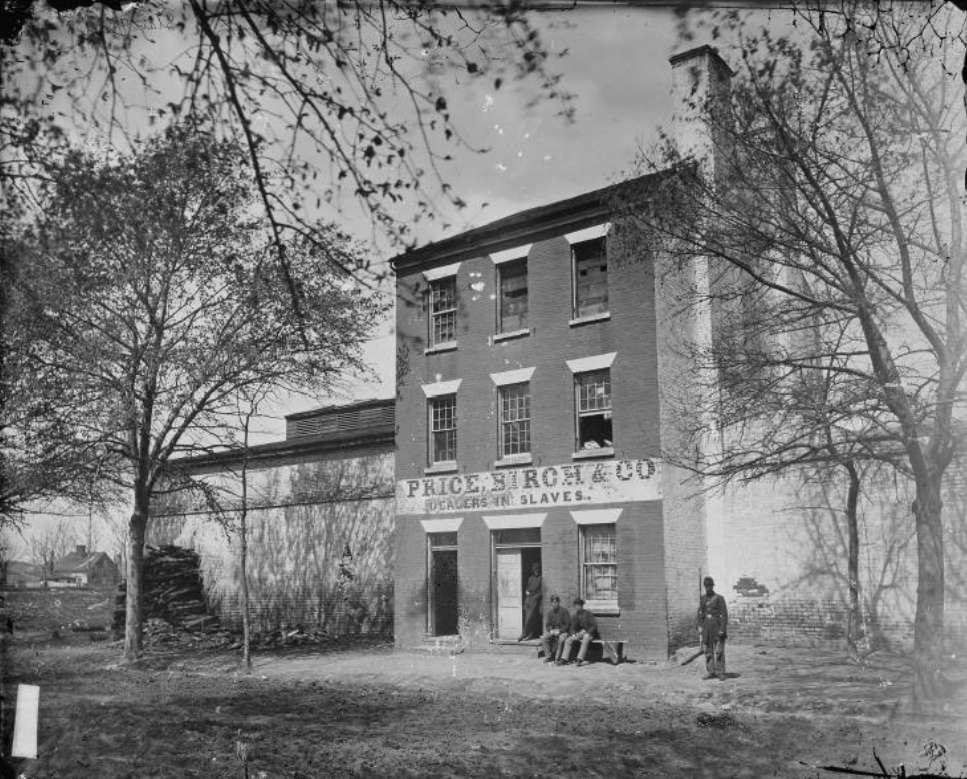
Dorcas Allen faced an impossible choice.
In 1837, Allen was sold, along with her four children, to a slave trader and sent to a pen on Duke Street — where the Freedom Museum stands today.
Faced with the prospect of seeing her children taken and sold into slavery, Allen killed her two youngest children. Allen pleaded not guilty by reason of insanity.
A lecture by historian Alison Mann on Thursday, April 18, will discuss the murder of the children and its impact on the region. Mann is a historian at the National Museum of American Diplomacy and a subject matter expert in the field of diplomatic history at the U.S. Department of State.
The lecture is scheduled from 7-8 p.m. at the Lyceum (201 S. Washington Street).
Tickets are $15 per person or $12 for volunteers/members of Historic Alexandria. All proceeds go to supporting the Freedom House Museum.
According to the Office of Historic Alexandria:
Learn about Dorcas Allen, a woman living with her husband and four children as a free Black woman in Washington D.C. who was enslaved by James Birch, imprisoned in Alexandria, and tried for the murder of her two youngest children. A jury acquitted her by reason of insanity and, with John Quincy Adams’ assistance, she regained her freedom. This is a story of African American agency in the most desperate of circumstances…when an enslaved mother feels death is better for her children than life in bondage.

Alexandria is going all out this year for its sweet 275, and it doesn’t look a day over 200.
The anniversary is in July, marking 275 since the city was founded in 1749, but the party starts in April.
The kick-off is at Waterfront Park on Saturday, April 6, from noon to 4 p.m.
“We’ll be debuting an exciting new archaeology exhibit on recently uncovered ships at the Robinson Landing Gallery on the corner of the Strand and Pioneer Mill Way, showing off some of our City’s historic and public safety vehicles, and planting the first of 275 new trees,” the city said in a release. “Come get a 275th Passport to guide your journey through all the fun at our City’s 275th Anniversary Kickoff.”
According to the release:
This milestone is not just a recognition of more than two centuries of history; it’s also an opportunity to amplify the shared experiences of our community and the collective achievements that have shaped our City’s identity.
ALX275 is everyone’s chance to take part in history! Share your story to be memorialized in our City’s history. Don’t forget to download the City’s Social Media Toolkit to join in the celebration.
Residents will be encouraged to join us via public transportation through a partnership with DASH and GoAlex. Dedicated bus routes will be available on April 6.
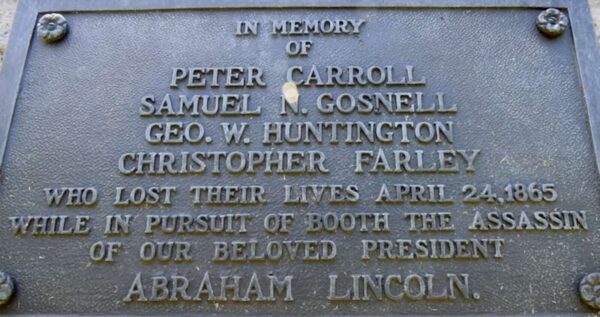
Fans of Apple’s new show Manhunt about the search for Abraham Lincoln’s assassin may be interested to learn that four Alexandria firemen who died during the 12-day search for John Wilkes Booth are buried in Alexandria National Cemetery.
The federal government initiated a massive search for Booth after Lincoln’s assassination on April 14, 1865. The search included usage of the Black Diamond, a ship made up of more than a dozen employees of the Alexandria Fire Department working with the Army Quartermaster Corps, according to the U.S. Department of Veterans Affairs.
The crew was tasked with patrolling the Potomac River in case Booth tried to slip across into Maryland.
Booth crossed the Potomac on April 22. Three days later, the Black Diamond crashed into the Massachusetts ferryboat, which was transporting approximately 400 former Union prisoners. The crash killed four members of the Black Diamond and 83 passengers of The Massachusetts.
Despite the war ending earlier that month, the four firemen — Peter Carroll, Christopher Farley, Samuel Gosnell and George Huntington were buried alongside Civil War casualties in Soldier’s Cemetery, now known as Alexandria National Cemetery (1450 Wilkes Street).
The federal government placed a granite boulder at the cemetery recognizing the firemen in the 1920s, and in the 1950s replaced their individual grave markers to have the same design as those of Union soldiers, according to the U.S. Department of Veterans Affairs.
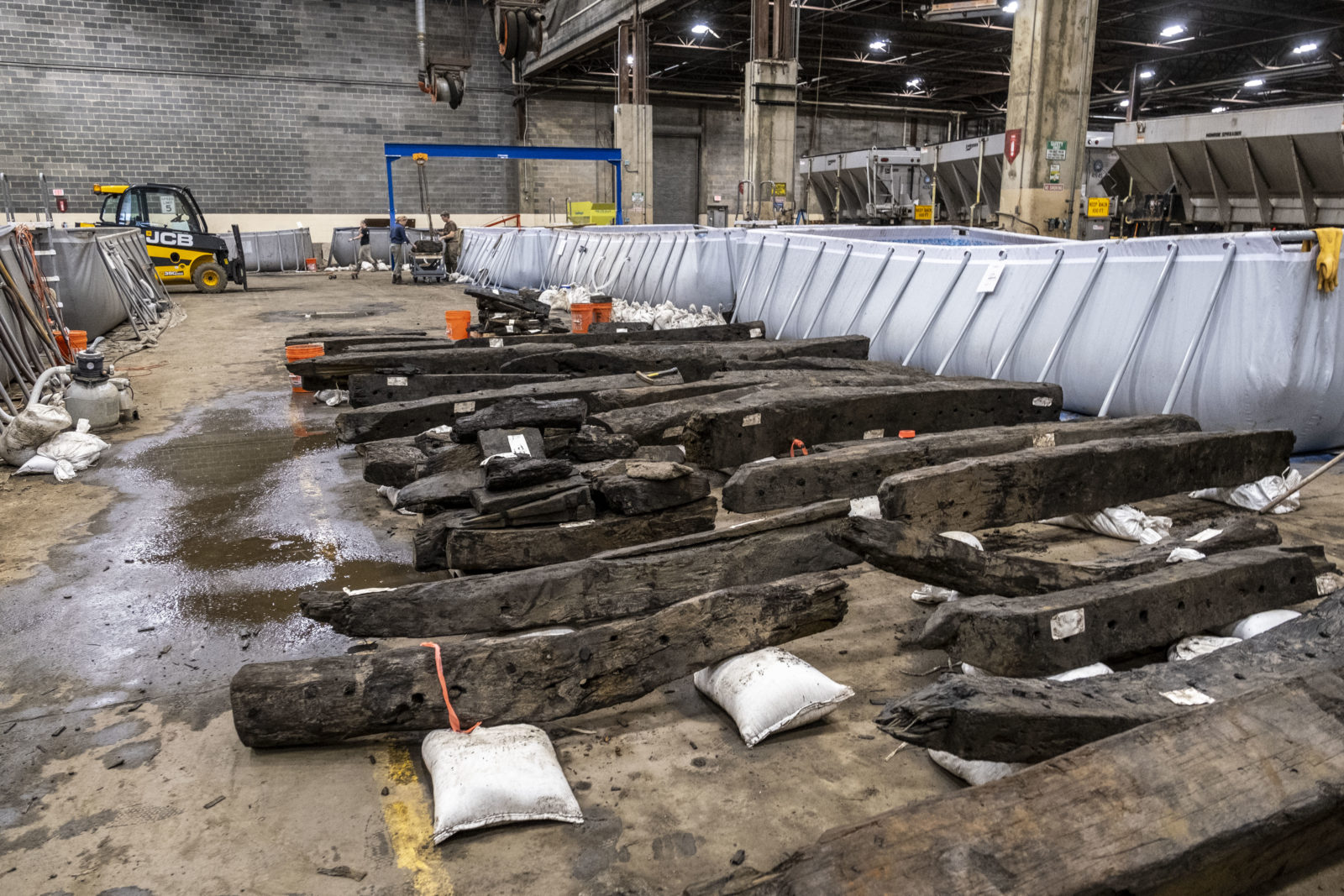
(Updated 11:15 a.m.) A new ‘windowfront exhibit’ about the Buried Ships of Robinson Landing is coming to Old Town early next month.
The exhibit features scale models of four 18th and 19th-century ships discovered during excavations of the Robinson Landing Site.
According to an event listing:
In 2018, archaeologists excavated the three historic vessels from the Robinson Landing Site, on the same block as the new exhibit. The scale models show what these ships may have looked like in the late 18th and early 19th centuries. Archaeologists will join City officials to speak on the exhibit’s debut.
The exhibit is set to open on Saturday, April 6, at the corner of the Strand and Pioneer Mill Way. The ribbon-cutting will be that day at 1 p.m.
The models will be on display in Old Town. Three of the original ships have re-sunk in the pond at Ben Brenman Park as part of a preservation effort, while the third is still at Texas A&M undergoing conservation work.

If you’re looking for something to do tonight (Friday), Gadsby’s Tavern Museum is hosting a 21-and-over “Tavern Games Night“.
The event is scheduled for 7-9 p.m. at Gadsby’s Tavern Museum at 134 North Royal Street.
“Gadsby’s Tavern Museum invites you to step back in time and relive the spirited ambiance of 18th-century taverns at ‘Tavern Games Night’ on March 1,” a release said. “Immerse yourself in the enchanting world of historical gaming as Gadsby’s Tavern Museum brings the 18th-century ‘sporting’ culture to life. Join us for an engaging presentation on the gaming customs of the era, followed by the opportunity to try your hand at a variety of authentic 18th-century games.”
Tickets are priced at $25 per person and must be purchased in advance. Attendees must be 21 and older.
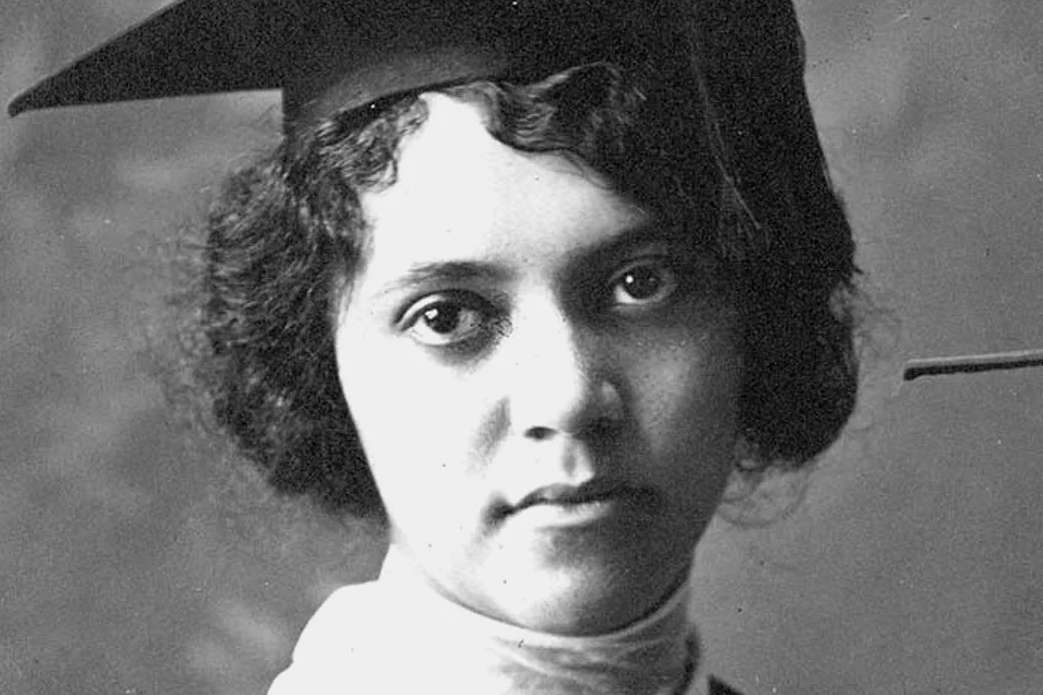
March is Women’s History Month and there are events across the city discussing women who helped shape Alexandria.
Events include a lecture by Jane Plitt, Director of the National Center of Women’s Innovations, on how women shaped the world of healthcare, from curing leprosy to developing cataract eye surgery, but it took years for their role in the field to be recognized.
“She will be sharing the buried stories of a number of women who were innovators in health care including Dr. Patricia Bath (cataract eye surgery), Dr. Katalin Kariko (mRNA development), Dr. Svetlana Mojsov (Ozempic), Chemist Alice Ball (cure for leprosy), and Drs. Doudna and Charpentier (genome editing technology),” the event listing said. “These women fundamentally altered health for so many of us, and yet struggled to be recognized for their roles.”
The lecture is scheduled for Sunday, March 10, from 12:30-2:30 p.m.
A tour later that month at the Stabler-Leadbeater Apothecary Museum (105-107 S. Fairfax Street) will examine the role of midwives in the city beyond just delivering babies.
Events include:
- Alexandria Hospital: Women Mobilize the Community — Alexandria History Museum at the Lyceum (201 S. Washington Street), open until March 31
- Lecture: How Women Changed the World of Health Care But Took Years to Be Recognized — Lyceum on Sunday, March 10, from 12:30-2:30 p.m.
- Dorcas Allen Lecture, by Dr. Alison Mann — Lyceum on Saturday, March 16, from 3-4 p.m.
- Specialty Tour: A Toast to the Ladies! — Gadsby’s Tavern Museum (138 N. Royal Street), Friday, March 8 and Saturday, March 9 from 6-7:30 p.m.
- Call the Midwife! Women in Historic Medical Care — Stabler-Leadbeater Apothecary Museum (105-107 S. Fairfax Street), Friday, March 22, 6-7 p.m. and Saturday, March 23, 10-11 a.m.
- Civil War Women’s Day — Fort Ward Museum & Historical Site (4301 W. Braddock Road) on Saturday, March 30, from 11 a.m.-4 p.m.

